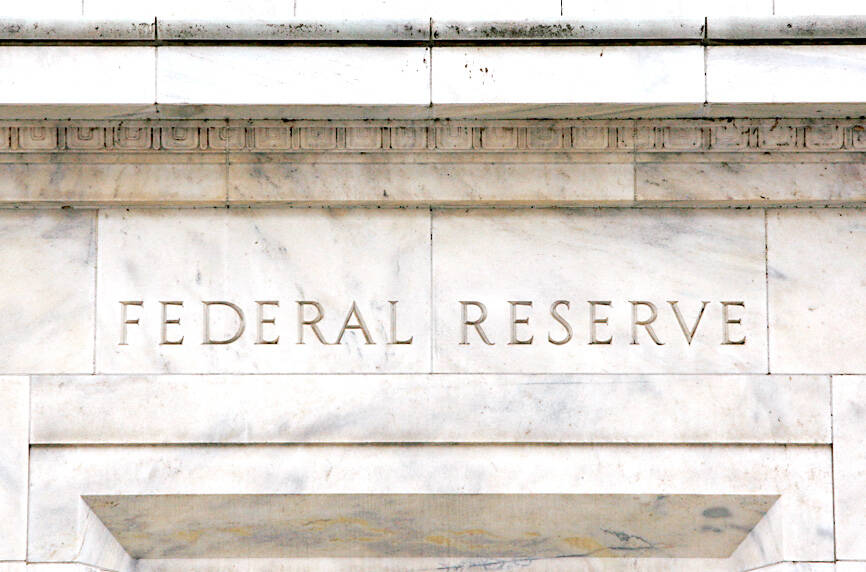The US Federal Reserve is no longer expected to cut interest rates at its policy meeting next month, Nomura Holdings Inc said, making it the first global brokerage to signal a pause in the US central bank’s rate-cutting cycle in the wake of Donald Trump’s election win.
Nomura now expects the Fed to deliver only two 25-basis-point rate reductions at its March and June meetings next year, leaving the brokerage’s Fed funds rate projection unchanged at 4.125 percent throughout the year.
The Fed’s benchmark overnight interest rate is currently in the 4.50 to 4.75 percent range. It has cut rates by 75 basis points this year.

Photo: Reuters
Other global brokerages, including Goldman Sachs Group Inc and JPMorgan Chase & Co, anticipate a 25-basis-point cut from the US central bank next month.
INFLATION RISKS
Nomura expects the Fed to halt its tightening cycle next month after recent hawkish remarks from policymakers amid ongoing economic growth and the likelihood of further elevated inflation, adding to the central bank’s indication that it is not in a hurry to lower rates.
This follows the Fed’s increasing hesitancy to cut rates as a major political shift is under way after Trump’s presidential victory.
Wall Street is trying to reconcile what it sees as further inflationary pressures in the coming year as the US president-elect pushes for tax cuts, higher tariffs and a crackdown on immigration.
“We currently expect tariffs will drive realized inflation higher by the summer, and risks are skewed towards an earlier and more prolonged pause,” Nomura said in a note on Friday.
Traders now see a 34.7 percent chance of the central bank pausing rate cuts next month, according to CME Group Inc’s FedWatch Tool.
FRAGMENTATION
Separately, European Central Bank Governing Council member Joachim Nagel sees the threat of a further fragmentation of the global economy, which could present central banks with new challenges in the form of higher or more volatile inflation.
“The first signs of geoeconomic fragmentation are becoming increasingly evident — and unfortunately, we may be on the brink of significant escalation,” the German central bank chief said yesterday in Tokyo. “This is a concerning development, and we should all strive to restore cooperation and free trade.”
If international tensions should intensify, this could lead to greater inflationary pressures or increased volatility in consumer-price growth and central banks might have to react with higher interest rates, Nagel said.
“We can and will do what is necessary to maintain price stability,” he said.
The Bundesbank president has repeatedly warned the re-election of Trump augurs a protectionist era and threatens to fragment the global economic order.
The Republican has, among others, pledged to impose 60 percent tariffs on China and as much as 20 percent on everyone else, raising fears of full-blown trade wars.
Additional reporting by Bloomberg

Vincent Wei led fellow Singaporean farmers around an empty Malaysian plot, laying out plans for a greenhouse and rows of leafy vegetables. What he pitched was not just space for crops, but a lifeline for growers struggling to make ends meet in a city-state with high prices and little vacant land. The future agriculture hub is part of a joint special economic zone launched last year by the two neighbors, expected to cost US$123 million and produce 10,000 tonnes of fresh produce annually. It is attracting Singaporean farmers with promises of cheaper land, labor and energy just over the border.

US actor Matthew McConaughey has filed recordings of his image and voice with US patent authorities to protect them from unauthorized usage by artificial intelligence (AI) platforms, a representative said earlier this week. Several video clips and audio recordings were registered by the commercial arm of the Just Keep Livin’ Foundation, a non-profit created by the Oscar-winning actor and his wife, Camila, according to the US Patent and Trademark Office database. Many artists are increasingly concerned about the uncontrolled use of their image via generative AI since the rollout of ChatGPT and other AI-powered tools. Several US states have adopted

A proposed billionaires’ tax in California has ignited a political uproar in Silicon Valley, with tech titans threatening to leave the state while California Governor Gavin Newsom of the Democratic Party maneuvers to defeat a levy that he fears would lead to an exodus of wealth. A technology mecca, California has more billionaires than any other US state — a few hundred, by some estimates. About half its personal income tax revenue, a financial backbone in the nearly US$350 billion budget, comes from the top 1 percent of earners. A large healthcare union is attempting to place a proposal before

KEEPING UP: The acquisition of a cleanroom in Taiwan would enable Micron to increase production in a market where demand continues to outpace supply, a Micron official said Micron Technology Inc has signed a letter of intent to buy a fabrication site in Taiwan from Powerchip Semiconductor Manufacturing Corp (力積電) for US$1.8 billion to expand its production of memory chips. Micron would take control of the P5 site in Miaoli County’s Tongluo Township (銅鑼) and plans to ramp up DRAM production in phases after the transaction closes in the second quarter, the company said in a statement on Saturday. The acquisition includes an existing 12 inch fab cleanroom of 27,871m2 and would further position Micron to address growing global demand for memory solutions, the company said. Micron expects the transaction to